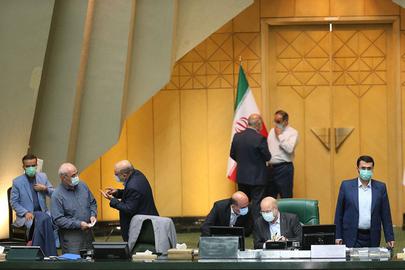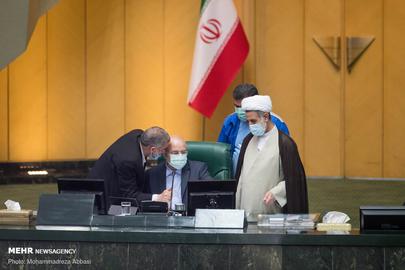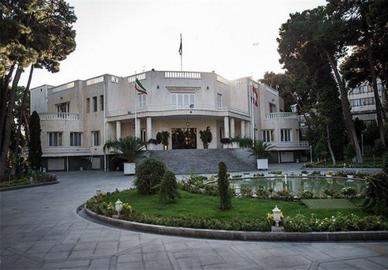Iran’s official state news agency has revealed that the 2021-2022 budget scandal is more extensive than previously thought, prompting threats that legal action might be taken against the agency for its publication of “fake news”.
Iranians were still absorbing the shock of the budget scandal when further news emerged of the extent of the last-minute changes. Islamic Republic News Agency (IRNA) published a comprehensive 20-row table outlining the scope of the budget overhaul, which saw substantial amounts of funds redirected to benefit the political and ideological agendas of an elite few.
The manipulation of the budget was orchestrated by a group of MPs and Speaker of the Parliament Mohammad Bagher Ghalibaf.
It was the first time elected politicians in Iran have directly interfered in a budget passing into law. It was also the first time a budget has been altered after going through parliament’s approval process.
Changes to the budget included the following: the allocation of 1,500 billion tomans to Islamic Republic of Iran Broadcasting-backed “cyberspace activists”; doubling the budget for the Basij organization, the voluntary wing of the Revolutionary Guards, so that the current allocation is 4,167 billion tomans; the allocation of 200 billion tomans for the Islamic Propaganda Organization’s cyber unit; and allocation of 80 billion tomans to the organization’s middle-rank employees. Thes changes all attracted considerable media attention and commentary on social media.
A day after the IRNA report was published, the director general of parliament threatened to sue the agency for publishing the news, dismissing it as "completely fake" and “false”.
Following these remarks, the official government news agency released a statement acknowledging that its reporting, and the detailed table it had published, had included incorrect information and apologized, stating that the mistake had been the result of one reporter's “negligence”.
IRNA's apology to Speaker Mohammad Bagher Ghalibaf and Elias Naderan, chairman of the Budget Committee, and their supporters was an obvious attempt to deny the budget fudge had taken place and a tactic to regain control over the narrative about Iran’s finances and conduct in parliament.
Two Events, One Narrative
To understand what actually happened, it’s important to separate the two developments: first, the budget corruption scandal and, secondly, the reporting of it.
The first issue concerns the controversial amendment of the budget during the Parliamentary Budget Committee's approval process. This is a legal process, and the deeper and wider the changes, the more complicated and difficult it is to integrate and implement the budget effectively, which makes planning for priorities more difficult.
What IRNA revealed in its reporting was just a small number of the changes that had been made during the Budget Committee and parliament’s process of reviewing and approving the government bill. The changes were in fact much more extensive.
The changes highlighted in the table published by IRNA concern limited cases. However, these cases clearly show the political tastes and agendas of members of parliament, what programs and policies they favor, and which institutions and bodies outlined in the budget they support. For example, the table shows that the activities of the Islamic Republic’s propaganda organizations — both online and off — are of particular interest for MPs, and these are among the budget items that were dramatically amended, resulting in the allocation of huge resources to the Organization for Audio-Visual Media Regulation (SATRA).
Notably, Mohammad Javad Jahromi, the Minister of Communications and Information Technology, criticized support for the organization, and said: "SATRA has neither a statute nor is its remit and reach clear. Also, the funding mechanism for the IRIB is not transparent."
A Budget That Sets a New Precedent
The 2021-2022 budget bill has been like no other in recent history, mainly because of the skewed process: it went back and forth to the parliament, and there were last-minute changes to figures and allocations. For these reasons, it has understandably been the focal point for disagreements and debate.
The general resources of the original budget totaled more than 841 trillion tomans, which, after review and approval in parliament and becoming law, saw an increase that brought the final total to 1,278 trillion tomans. This increase of 437 trillion tomans represents a growth of about 52 percent in public budget resources.
The magnitude of this number and an assessment of its origin and where it actually ended up provide staggering evidence of what ensued. Some MPs who supported and helped produce the current budget argue that the major discrepancies are due in part to the aggregation of scattered numbers across the budget being then presented as a single item in the budget table.
Other allocations not represented in the table IRNA published represent a total of about eight trillion tomans’ worth of changes made to allocations for institutions and departments. This table is not "fake", as Ghalibaf says. The table gives an accurate presentation of what is now the legally-binding budget. What it doesn’t do is give any oversight or representation of a a small number of MPs’ covert manipulation of the budget, which took place essentially overnight, and after the final budget had been approved.
The IRNA Report
The IRNA report was the culmination of a string of other media stories and public comments. First there was the Instagram post and tweets from Ali Khezrian, the MP for Tehran. Then the situation ramped up when 100 MPs published a letter of protest addressed to Mohammad Bagher Ghalibaf.
The MP’s letter flagged a flagrant, unprecedented violation of parliamentary procedure, and described how a small number of the members of the Budget Committee, including Elias Naderan, chairman of the committee, changed the budget after it had been approved by parliament but before it had been submitted to the government a month later. The MPs were not informed about these changes, and this was set out in the letter too.
Specifics of the changes were not officially announced, although the IRNA report gives some indication.
Budget Blackout
The scandal has highlighted fundamental problems in the way the budget is prepared and discussed in parliament. There are open sessions in parliament, but MPs are only informed of the figures pertaining to the overall budget and not given access to the finer details. These are for the eyes of the Budget Committee and specialist commissions.
These details are as important as the figures of the overall budget but are obviously not presented to MPs in other to avoid too many people reviewing and assessing the details.
Given that the Budget Committee has the upper hand when it comes to moving, increasing or decreasing figures, it also enjoys considerable power over the fate of the country’s institutions, government departments, and programs.
Historically, parliamentarians have not seen the budgets for state-owned companies, and most of them have not had the patience to do so anyway. These budgets had always been decided on hastily and oversight has been slight and focused on generalities.
Iran’s annual budget and the method by which it is reviewed in parliament has come under fire countless times before. It more often than not becomes a tool for political bargaining and retaliation, effectively losing its function as a one-year financial plan to achieve national goals, prio
priorities and visions set out in planning and development documents and plans.
It would be a positive outcome if the latest scandal prompted the much-needed reform in parliament, and in the way national finances are handled. The fact that parliamentary rules on budgets could be ignored and overridden with relative ease indicates just how flawed and dysfunctional the process is. But given that so much political and financial gain is at stake, this reform is unlikely to be enacted.
Related coverage:
Speaker of Parliament Implicated in Iran's Budget Manipulation Scandal
The Corrupt Commander is the New Speaker of the Parliament
The Revolutionary Guards' Outsize Share of Iran's Next Budget
visit the accountability section
In this section of Iran Wire, you can contact the officials and launch your campaign for various problems


























comments